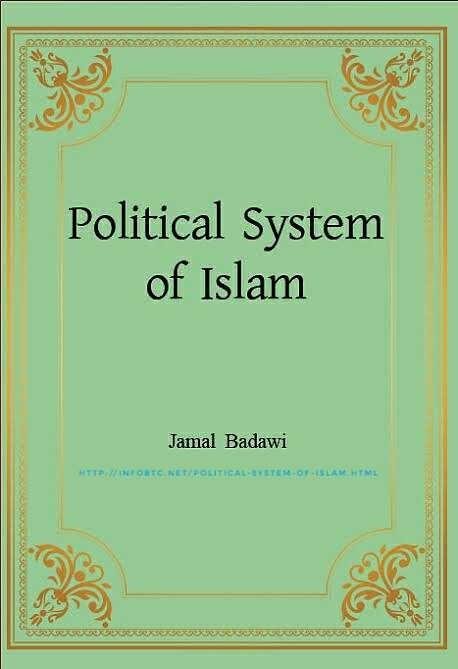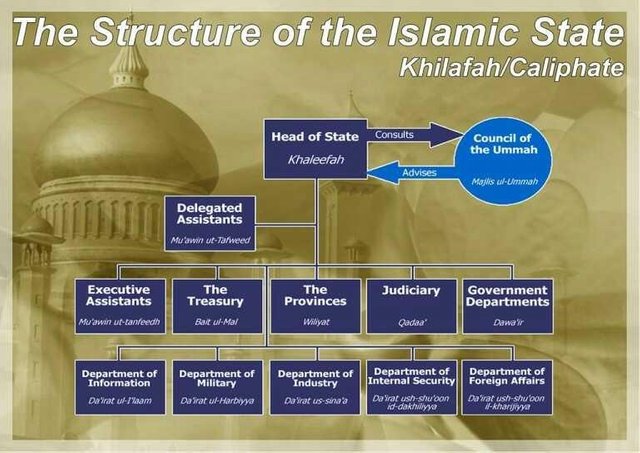The Principles of Islamic Political Systems
Politics in Islam leads the ummah to the efforts to support and implement the Shari'a aims to summarize all corners of Islam syumul through an institution that has siyasah to mengaju and implement the law. This understanding coincides with the word of God:
"And say; My God, put me in the right way and put me out of the truth, and give me from the side of the Power which is helpful. (Al-Isra ': 80) "
The Principles of Islamic Political Systems

Source Image
A. Hakimiyyah Ilahiyyah
Hakimiyyah or granting the judiciary power and the supreme sovereignty of the law in the Islamic political system are only absolute right of Allah.
"And He is God, there is no god but Him, to Him praise in the world and in the Hereafter, and to Him all determinations and unto Him are ye restored. (Al-Qasas: 70)"
Hakimiyyah Ilahiyyah brought the following notions:
That God Sustainer of the universe is essentially the God who keeps man, and there is no other way for human beings than to be obedient and submissive to His Divine Divinity.
That the right to judge and prosecute is not owned by anything except God.
That Allah alone has the right to issue the law because He is the only Creator.
That Allah alone has the right to issue rules because He is the only owner.
That the law of God is true because only He alone knows the nature of all things and in His hand is the determination of guidance and the determination of the path that is saved and straight
Hakimiyyah Ilahiyyah means that the main terrace to the political system of Islam is tauhid to Allah in terms of Rububiyyah and Uluhiyyah.
B. Treatise
The Minutes means that the apostolate of some men among men from the Prophet Adam to the Prophet Muhammad SAW is an important principle in the Islamic political system.
It is through the basis of this message that the apostles represent God's supreme authority in the field of law in human life. The apostles conveyed, interpreted and translated all the revelations of God by utterance and deeds.
In the Islamic political system, Allah has commanded that man accept all orders and restrictions Rasulullah SAW. Man is required to submit to the commandments of the Prophet SAW and not take apart from the Messenger of Allah to be a judge in all disputes that occur between them. God's Word:
"What are the spoils (fai-i) that Allah gave to His Messenger who came from the inhabitants of the cities then is for Allah, the Messenger, the Apostle's relatives, the orphans, the poor and the people who are on the way , that the treasure should not be circulated among the rich among you alone. What the Apostle gives you then accept him. Leave what he forbids; and fear Allah. Lo! Allah is harsh in His punishment. (Al-Hasyr: 7) "
"So by your Lord, they (in substance) do not believe until they make you judge in their disputed case, then they do not object to their judgment in their hearts, and they fully accept. (An-Nisa ': 65) "
C. Khilafah
Khilafah means representative. The position of man on this earth is the representative of God. Therefore, with this mandated power, man should exercise the law of God within the prescribed limit. On this foundation, man is neither ruler nor owner but merely the khalifah or representative of God who becomes the true Owner.
"Then We made you their substitutes in the earth after them, that We may see how you behave. (Jonah: 14) "
A Caliph only becomes a valid Caliph as long as he truly follows the laws of God. He guided the Caliph's duty to be held by those who fulfilled the following conditions:
Consists of those who can truly accept and support the principles of responsibility which are summarized in the meaning of khilafah.
It is not composed of oppressors, fasiq, fajir and neglect of God and acts in violation of the limits set by Him.
Consists of people of knowledge, intelligence, intelligence, wisdom and intellect and physical ability.
Consists of those who are trustworthy so that they can be held responsible to them with confidence and without hesitation.
Key Principles of the Islamic Political System
A. Discussion
The principle of the main deliberations adlah is related to the election of heads of state and oarang-oarang who will take care of the main tasks in pentadbiran ummah. The second principle of deliberation concerns the determination of the way and the way in which laws are implemented in the Qur'an and As-Sunnah.
The principle of subsequent deliberation is with regard to the ways of determining new cases arising in the Ummah through the process of ijtihad.
B. Justice
This principle is related to social justice guaranteed by the social system and Islamic economic system. In its widespread practice, the principles of justice contained in the Islamic political system include and encompasses all kinds of relationships that apply to human life, including justice between the people and government, between the two sides that are before the court, between married couples and between the mother father and her children.
Being fair and avoiding wrongdoing is among the main principles of the Islamic social system, it becomes the main role of the Islamic political system to maintain that principle. Maintenance of justice is the principal principle of social values because it can be confirmed by human life in all its aspects.
C. Freedom
The freedom which the Islamic political system sustains is freedom which is fixed to makruf and virtue. Upholding the principle of true freedom is the most important objective for the Islamic political system and government as well as the main principles for institutional legislation of the Islamic state.
D. Equation
The equation here consists of equality in obtaining and claiming rights, equality in assuming responsibility according to the ranks established by institutional law and equality under the rule of law.
E. The right to count on the government
The right of the people to menghisab the government and the right to get an explanation of his actions. This principle is based on the government's obligation to conduct deliberation in matters relating to the affairs and administration of state and ummah. The right of the people to be affiliated means the obligation of every member in society to uphold the truth and abolish munkar.
In the broadest sense, it also means that the people have the right to monitor and count the actions and decisions of the government.
Political Objectives According to Islam
The objective of the Islamic political system is to awaken a system of government and state upright on the basis of implementing all Islamic sharia law. The main goal is to uphold an Islamic state or Darul Islam.
With a government that supports the Shari'a, it will uphold Ad-Din and continue all human affairs according to the demands of the Ad-Din.
The Islamic fuqaha has outlined 10 important matters as a goal to the Islamic political system and government:
Maintaining faith according to principles agreed upon by salaf ulamak rather than Muslims.
Carry out judicial proceedings among the people and solve problems among disputants.
Maintain the security of Islamic areas so that people can live in a safe and peaceful state.
Carry out the punishments set forth syarak for the protection of human rights.
Maintain state borders with various weapons to deal with possible attacks rather than outsiders.
Launch jihad against groups opposed to Islam.
Controlling the affairs of excise quotation, zakat, and alms as defined by syarak.
Arrange budgets and shopping budgets rather than state treasury not to be used extravagantly or miserly.
Inaugurate the honest and honest employees to guard the state's wealth and to redefine the pentadbiran of the State.
Run a neat guard and inspection in layman's way to lead the country and protect Ad-Din.
Reference:
Revelation 3 - Islamic Systems, Abu Urwah
Ash-Shadr, Sayid Muhammad Baqir. 2001. Islamic Political System: An Introduction. Jakarta: Lantern.
Pulungan, J. Suyuthi. Dr. 1993. Fiqh Siyasah: The Doctrine of History and Thought. Jakarta: PT. Raja Grafindo Persada.
Al-Jabiri, Muhammad Abid. 2001. Religion, State: In Sharia Application. Yogyakarta: Fajar Pustaka Baru
Azra, Azyumardi, Dr. 1996. Islamic Political Upheaval: From Fundamentalism, Modernism to Post-Modernism. Jakarta: Paramadina.
Regard,
@djamidjalal



Hi! This is jlk.news intelligent bot. I just upvoted your post based on my criterias for quality. Keep on writing nice posts on Steemit and follow me @jlkreiss to get premium world news updates round the clock! 🦄🦄🦄
Thanks you so much @jlkreiss sir.
Okey. I have followed you
sanggt bermanfaat postingannya bg
Hee... Terimaksih bg big boss
heheh samasama
Oke bang. Sukses untukmu